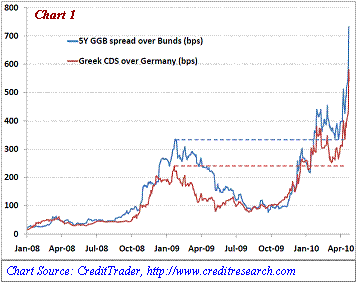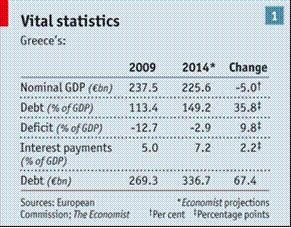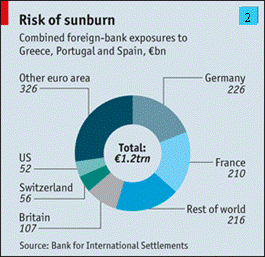Greek Debt Crisis: Lehman 2.0?
Interest-Rates / Global Debt Crisis Apr 25, 2010 - 06:58 AM GMTBy: Dian_L_Chu
 As if Greece did not already have enough problems. The market was already jolted by the Goldman SEC case. Then, it was the cloud of volcanic ash from Iceland postponed a key meeting with European Union (EU) and International Monetary Fund (IMF) officials on aid for the country.
As if Greece did not already have enough problems. The market was already jolted by the Goldman SEC case. Then, it was the cloud of volcanic ash from Iceland postponed a key meeting with European Union (EU) and International Monetary Fund (IMF) officials on aid for the country.
When the Officials from the EU and IMF finally launched a two-week talk on a Greek rescue package this Wednesday, it failed to calm the bond markets.
Slow Talk, Bond Rout & Downgrade
 To make matters even worse, on Thursday, the European Union revised upward its estimate of Greece's 2009 deficit to 13.6% of gross domestic product (GDP) and may be revised to as high as 14.1%. On that news, ratings agency Moody's downgraded Greece's credit rating, the second time in five months.
To make matters even worse, on Thursday, the European Union revised upward its estimate of Greece's 2009 deficit to 13.6% of gross domestic product (GDP) and may be revised to as high as 14.1%. On that news, ratings agency Moody's downgraded Greece's credit rating, the second time in five months.
With a string of bad news, a bond market rout eventually pushed two-year Greek government bond yields above 10% and forced 10-year yields near 9% on Thursday.
Credit default swaps on Greece’s five-year bonds also surged to a record high of 577 (Chart 1). Meanwhile, the Greek curve remains steeply inverted with two-year yield higher than the 5-year bond, which indicates that the market sees significant near-term risks.
Temporary Liquidity Relief
At these levels, it is virtually impossible for the debt-strapped nation to meet its funding needs on the open market. This sharp jump in borrowing costs ultimately forced Greek government to formally request the joint EU-IMF rescue plan on Friday.
 After two months of intense debate among European governments and market speculations, the joint IMF-EU Greek rescue package has finally been decided earlier this month. The size of the rescue package reportedly amounts to about €45bn ($60bn, £40bn), of which less than a third will come from the IMF.
After two months of intense debate among European governments and market speculations, the joint IMF-EU Greek rescue package has finally been decided earlier this month. The size of the rescue package reportedly amounts to about €45bn ($60bn, £40bn), of which less than a third will come from the IMF.
The heavily indebted Greece needs to borrow some €54 billion this year and must refinance around €20 billion in April and May. Simple math could tell you this €45-billion bailout only helps avert a temporary liquidity crisis and would sustain Greece through this year at best.
Solvency Risk Remains
Calculations by The Economist suggest that even on optimistic assumptions, Greece will run up an extra €67 billion of debt by 2014, when its debt will peak at a scary 149% of GDP. (Table 1)
Greece underlying problems--flat growth, high debt load and interest costs--could take years to resolve. Additional rescue program(s) of at least an equivalent sum--or more--might be needed again in the next few years, depending on the progress of their austerity measures.
This means resorting to a “debt restructure” to defer loans or pay back less than it owed, could still be a distinct possibility.
No Way Out?
The proposed spending cuts and revenue raising measures have met with fierce resistance by the public workers. Economists such as Martin Feldstein argue in favor of exchange rate devaluation, hence an exit of the euro zone.
A steep devaluation of the currency to improve competitiveness would help achieve a recovery; however, being a member of the euro monetary union, Greece does not have this luxury. Furthermore, currency devaluation, even if feasible, would reduce the country’s buying power costing the country in the long run.
Another option - Greece could leave the EU and create a new national currency. The problem is that a potential bank run and the subsequent collapse of the domestic banking system would precede Greece’s exit of the EU, not to mention the chaos ensued converting bonds, etc. from euro into the new currency.
“A Second Lehman”
 According to estimates by The Economist, foreign banks’ exposure to Greece, Portugal and Spain combined comes to €1.2 trillion. European banks have lent most of this. German banks alone account for almost a fifth of the total. (Table 2)
According to estimates by The Economist, foreign banks’ exposure to Greece, Portugal and Spain combined comes to €1.2 trillion. European banks have lent most of this. German banks alone account for almost a fifth of the total. (Table 2)
Realizing failure to act risks a financial meltdown, German finance minister Wolfgang Chasuble pleaded with his people and told Der Spiegel that
"We cannot allow the bankruptcy of a euro member state like Greece to turn into a second Lehman Brothers…Greece's debts are all in euros, but it isn't clear who holds how much of those debts. The consequences of a national bankruptcy would be incalculable."
From Greece to Euro Zone
Worries about Greece’s widening deficit and has contributed to a 7.2% slide in the euro this year and sent ominous ripples across a stagnant European economy.
The proposed pact would cost EU members--almost all of them facing onerous debts already—additional €30bn ($40bn, £26bn) of debt. More bailouts could be expected with other highly indebted PIIGS nations waiting in the wing.
This no doubt will damage the euro's prestige, inevitably increase their debt burden, and further weaken the euro. Eventually, Greece might still default and the entire euro zone will likely face higher interest spread, and so the vicious debt & risk cycle would commence again.
Greece Does Matter
Jim O'Neill, head of global economic research at Goldman Sachs, argues that the Greek debt crisis does not really matter very much in the global scheme of things.
Nevertheless, the involvement of the IMF essentially shifts the Greece debt burden beyond the EU and to its members. The United States, Japan and the EU are among the top funding nations of IMF’s lending capacity.
The Greece crisis has let to increasing scrutiny of sovereign debt, and could be a small-scale sketch of other large nations, including the United States, which carry increasing levels of debt.
All this could all end horribly, if governments refuse to cut spending and markets refuse to fund that spending.
China To The Rescue?
In the meantime, IMF data shows that China and emerging markets have accumulated $4.8 trillion (£3.1bn) in foreign reserves. Roughly $1.7 trillion is invested in euro zone bonds. These bond holders with rising powers could play a deciding role on how Europe's drama unfolds.
So, before long, we may see new Chinese pagodas sprouting in the Mediterranean when the EU and IMF could no longer bankroll Greece, et. al.
Dian L. Chu, M.B.A., C.P.M. and Chartered Economist, is a market analyst and financial writer regularly contributing to Seeking Alpha, Zero Hedge, and other major investment websites. Ms. Chu has been syndicated to Reuters, USA Today, NPR, and BusinessWeek. She blogs at Economic Forecasts & Opinions.
© 2010 Copyright Dian L. Chu - All Rights Reserved Disclaimer: The above is a matter of opinion provided for general information purposes only and is not intended as investment advice. Information and analysis above are derived from sources and utilising methods believed to be reliable, but we cannot accept responsibility for any losses you may incur as a result of this analysis. Individuals should consult with their personal financial advisors.
© 2005-2022 http://www.MarketOracle.co.uk - The Market Oracle is a FREE Daily Financial Markets Analysis & Forecasting online publication.



